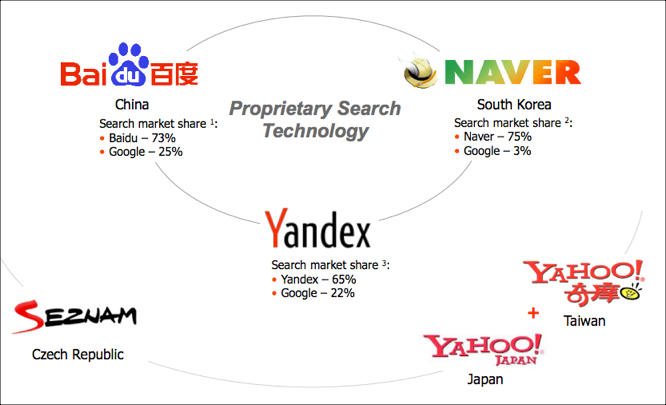Last month, at the International Search Summit conference in London, a Googler Gary Illyes, who presented some data on website geotargeting and Hreflang, revealed an interesting piece of information: Googlebot is now crawling the web out of three different geographical locations:
- Mountain view: Most SEOs know that this is the ‘defacto’ starting point for the Googlebot to start crawling the web
- Russia: Although he did not specify where in Russia, I am not surprised by this, as Google has been struggling to increase market share in this region for some time due to stiff competition from a stronger local opponent.
- South Korea: This is not surprising either. Their two main local search engines, Naver (72%) and Daum(18%), account for 90% of all searches in the Korean search engine market. What could Google possibly want here?
So Why SouthKorea and Russia?
Gary mentioned that they were not keen to let any more information go around as to the reasons why Google may now be crawling the web out of those two new geographical locations. So with this post, I am just throwing my two cents on this matter.
Google is clearly not hiding its plans as its engineers go out to conferences and use this information on their decks. But what are the reasons and Google’s interest in throwing their crawler from those two additional geographical locations?
It’s very clear:
Korea, next to Russia and together with China form the three main and major Google competitors in the international search engine market land. Google fears that some of these search engines will, at some point, defeat its almighty presence in other territories.
Google wants to dominate every single market. To become bigger and gain more market share, Google is trying to avoid big competitors like Baidu, Yandex, and Naver. China, Russia, and Korea are the three main markets where they don’t have the lion share’s chunk of search.
We also have Japan and Taiwan, where Yahoo boasts over 50% of the Search market, but its results are served up by Google, at least in Japan. So, effectively, Google controls and owns most of the search results in those two countries, too. This leaves us with just three: China, Russia, and Korea, which are the main difficult markets for Google to penetrate and dominate.
So, my take is that Google has brought the crawler here to begin drilling deeper into the search landscape in these markets.
source: Preston Carey’s slideshare
We are going to leave China out of the equation as Google is being restricted by China’s censorship internal wall and is not an easy market to penetrate. Years ago, they abandoned their attempts to walk inside the Chinese wall. So, leaving China aside, the two other ones in the spotlight are Russia and Korea.
Google wants to learn and understand more about those two local market search engines, their linguistic nuances, and the search results that make people want to use their local versions rather than Google’s own engine. Google wants to be able to provide equal, similar, or better search engine results than those offered by Korean Naver and Russian Yandex.
Some Stats about South Korea and Russia
Google boasts a very humble piece of the South Korean search engine market share (5%), with Naver having the lion share of search. The leading search engine in this market in Naver, with a difference, followed by Daum, and then Google in the last position.
This is potentially the most likely reason for Google to base its crawler on Japan’s strong economy and booming internet market and strengthen its presence thereby opening new offices. Otherwise, why not Japan?
In Russia, Google has a larger market share than in Korea: about 25%. Yandex is obviously enjoying the larger chunk: 65%. What is bad news for Google is that Yandex has been making plans to expand in recent years and has already begun expanding into emerging markets in Latin America, Europe, and Turkey. Yandex is nowadays the fastest-growing search engine.
So, as Yandex enjoys 62% of the share, Google may want to establish a base there to gain better and more insightful ‘intel’ about the Russian market.
Sure, but what about Baidu, they are also expanding and penetrating into other markets?
Yes, but as mentioned before, as they are not allowed to set up data centres in China unless the comply with censorship, which currently they dont, they are kind of leaving China and Baidu aside for the time being. However, my opinion is that Google will, in the end, bite the bullet and comply with Chinese censorship and government control rules on Internet use.
I wouldn’t be surprised if Google took a completely different approach and established a base in Beijing or another key location in China within a year or two. They could soon start easily crawling China’s wide web and gathering data, insights, and signals that help them streamline their results in Chinese to compete better with Baidu and stand a greater chance of increasing market share in this huge market.
And what about Bing and Yahoo?
Of course, Bing and Yahoo are competitors, too, but they are US companies, so it is easier for Google to get key info about how they operate. Plus, they are search engines that also struggle with international penetration in certain markets.
Yahoo for example is big in Japan, and in Taiwan and Hong Kong, but they don’t present a massive problem to Google’s monopolistic ambitions.
Yahoo’s UVP in Japan for example is not just ‘search’ but a range of localized mobile and social services that they provide to the local markets, which makes them unique and distinguishable in those countries. But are they truly competitors that may present a block to Google worth worrying about. I’d agree that Yahoo and Bing may be serious competitors to Google but on a different level.
What do you think? Can you speculate on why Google may now be crawling the web out of South Korea and Russia and not anywhere else, like Spain, Malaysia, or Wallis & Futuna?
Articles I have read as reference for this post :
http://googlewebmastercentral.blogspot.fr/2006/09/how-to-verify-googlebot.html
http://www.link-assistant.com/blog/google-vs-naver-why-cant-google-dominate-search-in-korea/
http://returnonnow.com/internet-marketing-resources/2013-search-engine-market-share-by-country/
http://searchengineland.com/matt-cutts-in-south-korea-109861




Leave a Reply